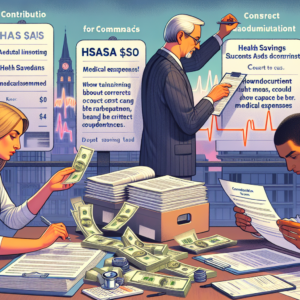In the world of healthcare savings accounts (HSAs), it is crucial to stay on top of your contributions and have proper documentation for eligible medical expenses. By reviewing your contributions regularly and keeping track of your medical expenses, you can ensure that you are making the most out of your HSA. This article will guide you through the importance of reviewing your contributions and the significance of having proper documentation, providing you with valuable insights to maximize your healthcare savings.

Review Contributions to HSAs
1. Contributions Made
One important aspect of managing your Health Savings Account (HSA) is reviewing the contributions you have made. Tracking your contributions is crucial to ensure that you are taking full advantage of this valuable healthcare savings tool. By regularly reviewing your contributions, you can stay on top of your healthcare expenses and make informed decisions about your healthcare needs.
To review your contributions, start by gathering all the relevant documentation, such as pay stubs, bank statements, and any records of transfers or deposits into your HSA. Take the time to review these documents carefully, ensuring that the amounts contributed match your intended contributions. If you notice any discrepancies, it is essential to reach out to your employer or HSA provider to address the issue promptly.
2. Contribution Limits
Understanding the contribution limits for your HSA is crucial to avoid any potential compliance issues and to maximize the benefits of your account. The contribution limits set by the Internal Revenue Service (IRS) can change annually, so it’s vital to stay up-to-date with the latest guidelines.
For the year 2021, the contribution limit for an individual with self-only coverage under a high-deductible health plan is $3,600. If you have family coverage under a high-deductible health plan, the contribution limit increases to $7,200. Additionally, individuals who are 55 years or older are eligible for catch-up contributions, allowing them to contribute an additional $1,000 above the regular limits.
By knowing and adhering to these contribution limits, you can ensure that you are maximizing the tax advantages and savings potential of your HSA.
3. Employer Contributions
Employer contributions to your HSA can provide a significant boost to your healthcare savings. Many employers offer contributions as part of their employee benefits package to help employees manage their healthcare expenses.
When reviewing your contributions, be sure to account for any employer contributions that have been made to your HSA. These contributions can vary depending on your employer’s policies, but they can make a substantial difference in your overall savings. Contact your HR department or benefits administrator to understand the specifics of your employer’s contribution plan.
4. Catch-up Contributions
If you are 55 years or older, you have the opportunity to make catch-up contributions to your HSA. Catch-up contributions allow individuals at or nearing retirement age to save additional funds for healthcare expenses. These contributions are above and beyond the regular contribution limits set by the IRS.
For 2021, individuals eligible for catch-up contributions can contribute an additional $1,000 to their HSA. By taking advantage of this opportunity, you can boost your savings and better prepare for any healthcare expenses that may arise as you age.
5. Penalty for Excess Contributions
While it is essential to maximize your HSA contributions, it is equally crucial to avoid exceeding the allowable limits. Contributions that exceed the IRS limits can result in penalties and tax consequences.
If you or your employer contribute more than the allowable limit to your HSA, the excess amount will be subject to taxation and penalties. These penalties can be costly and may jeopardize the intended tax advantages of your HSA.
To avoid these penalties, carefully track your contributions and ensure that they do not exceed the allowable limits. If you have mistakenly made excess contributions, consult with a tax professional or reach out to your HSA provider to rectify the situation promptly.
Ensure Documentation for Eligible Medical Expenses
1. Importance of Documentation
Having proper documentation for eligible medical expenses is crucial when it comes to managing your HSA. Documentation serves as evidence of your healthcare expenses, and without it, you may encounter difficulties in proving the eligibility of your expenses to the IRS or your HSA provider.
Maintaining accurate and comprehensive documentation is vital for proper recordkeeping and for potential audits or inquiries regarding your HSA. It provides you with peace of mind and ensures that you have the necessary documentation readily available when needed.
2. Examples of Eligible Medical Expenses
To ensure that your medical expenses qualify for reimbursement from your HSA, it is essential to understand what expenses are considered eligible. Eligible medical expenses generally include treatments, services, and products that are primarily for the prevention, diagnosis, or treatment of a medical condition.
Some common examples of eligible medical expenses include doctor’s visits, hospital stays, prescription medications, mental health counseling, chiropractic care, dental treatments, and vision care. Additionally, certain medical equipment, such as crutches or wheelchairs, and some alternative therapies, like acupuncture or naturopathy, may also be eligible.
It is essential to consult IRS Publication 502 or your HSA provider for a comprehensive list of eligible medical expenses, as the guidelines may vary depending on the specific healthcare plan and individual circumstances.
3. Documentation for Out-of-Pocket Expenses
When it comes to out-of-pocket medical expenses, it is crucial to retain all relevant documentation to support your HSA reimbursement claims. This includes receipts, invoices, and statements that clearly state the date, nature of the expense, and the amount paid.
By maintaining accurate documentation for your out-of-pocket expenses, you can easily demonstrate the eligibility of these expenses for reimbursement. This documentation can also serve as a useful reference for accurate recordkeeping and budgeting purposes.
4. Documentation for Insurance Payments
If you have health insurance and your provider covers a portion of your expenses, it is essential to keep records of any insurance payments made for healthcare services. These records should include statements from your insurance company that detail the amounts they have paid on your behalf.
Having documentation for insurance payments is crucial when seeking reimbursement from your HSA. It helps establish the portion of the expense that is your responsibility and confirms the amount you can claim for reimbursement.
5. Documentation for Prescription Medications
When it comes to prescription medications, it is essential to retain documentation that proves the medical necessity of the prescribed drugs. This can include prescription labels, pharmacy receipts, and statements that indicate the name of the medication, the prescribing healthcare provider, and the dates and costs of the prescriptions.
Proper documentation is necessary to demonstrate that the prescribed medications qualify as eligible medical expenses. It is also beneficial for tracking your medication usage, ensuring accurate refills, and managing any potential drug interactions or allergies effectively.
6. Documentation for Medical Procedures
If you undergo any medical procedures, surgeries, or treatments, it is crucial to keep thorough documentation of these expenses. This documentation should include detailed invoices, receipts, and statements from the healthcare provider, outlining the nature of the procedure, the date, and the cost.
Retaining proper documentation is essential to substantiate the medical necessity of the procedures and to provide evidence of the expenses incurred. This documentation also serves as a valuable resource for future reference, should the need arise for additional medical treatments or follow-ups.
7. Documentation for Medical Equipment
If you purchase or rent medical equipment, such as crutches, wheelchairs, or blood glucose monitors, it is crucial to retain documentation that supports the eligibility of these expenses. This documentation should include invoices, receipts, or statements that specify the equipment purchased, the date, and the cost.
Having proper documentation is vital for proving that the medical equipment qualifies as an eligible expense. It also allows for accurate recordkeeping and tracking of any warranties or potential repairs associated with the equipment.
8. Documentation for Alternative Therapies
Some individuals may seek alternative therapies to complement their healthcare regimen. Examples of alternative therapies may include acupuncture, naturopathy, or chiropractic treatments. If you choose to pursue these therapies and wish to claim reimbursement from your HSA, it is essential to maintain appropriate documentation.
Documentation for alternative therapies should include receipts, statements, or invoices from the healthcare provider that indicate the nature of the therapy, the dates of the sessions, and the associated costs. This documentation helps demonstrate the medical necessity of the therapies and ensures that you can receive reimbursement for these expenses.
9. Documentation for Over-the-Counter Medications
In certain cases, over-the-counter (OTC) medications may qualify as eligible medical expenses if they are prescribed by a healthcare provider. If you choose to purchase these OTC medications and seek reimbursement from your HSA, it is essential to retain proper documentation.
Documentation for OTC medications should include a prescription from a healthcare provider and any receipts or statements that indicate the nature of the medication, the dates, and the costs. This documentation helps establish the medical necessity of the OTC medication and ensures that you can receive reimbursement for these expenses.
10. Documentation for Transportation Expenses
Transportation expenses related to medical treatments can also qualify as eligible medical expenses. Whether it is mileage, parking fees, or public transportation costs, keeping accurate documentation is crucial.
When documenting transportation expenses, ensure to keep a log of the dates, the purpose of the trip, the mileage, and any associated costs. This can include receipts, invoices, or statements that indicate the amounts paid for parking fees or public transportation fares.
Proper documentation is essential to substantiate the eligibility of these transportation expenses and to ensure that you can claim reimbursement from your HSA.
In conclusion, reviewing your contributions to HSAs and ensuring documentation for eligible medical expenses are crucial steps in effectively managing your healthcare savings. By staying organized, tracking your contributions, and maintaining proper documentation, you can maximize the benefits of your HSA and confidently navigate your healthcare expenses. Remember, you have the power to take control of your healthcare savings and make informed decisions for your well-being.


